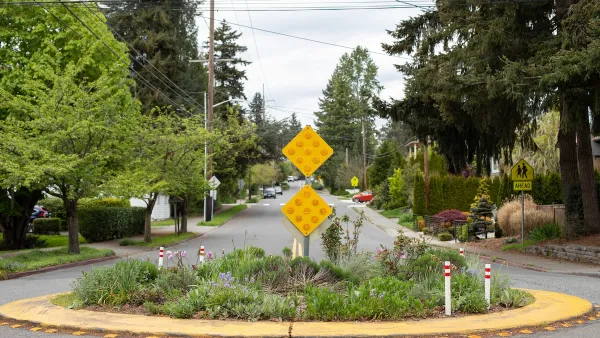Designers and "movement specialists" in Great Britain are pioneering various street designs that aim to bring traffic speeds down to teens, which they claim is the speed range that allows vehicles to safely share a space with pedestrians.
In Britain, a movement is underway to make the streets become "civilized." Hamilton-Baillie Associates, a firm from Bristol, has taken the concept of shared-space streets - an idea that had largely been implemented in small town settings - and transplanted it into the heart of London. Design strategies such as visually-interesting paving patterns, sidewalks that are level with the street, and diagonal street crossings have thus far been successful in cutting down automobile-pedestrian collisions, according to a report by The New Urban Network's Philip Langdon.
"Maybe it's a reflection of American car culture. Or maybe it's a sign of how risk-averse the United States has become. Whatever the reason, the US is a long way from catching up to Europe in designing streets that allow the flexible, unchoreographed mixing of cars, trucks, buses, bicycles, and pedestrians."
"A recent presentation by Ben Hamilton-Baillie at the Lincoln Institute of Land Policy in Cambridge, Massachusetts, highlighted how far Europe, and especially Great Britain, have gone toward letting motorists and pedestrians sort things out for themselves rather than having traffic engineers impose a strict order on circulation."
FULL STORY: Pedestrians take to the streets: motorists learn to coexist

Planetizen Federal Action Tracker
A weekly monitor of how Trump’s orders and actions are impacting planners and planning in America.

Chicago’s Ghost Rails
Just beneath the surface of the modern city lie the remnants of its expansive early 20th-century streetcar system.

Amtrak Cutting Jobs, Funding to High-Speed Rail
The agency plans to cut 10 percent of its workforce and has confirmed it will not fund new high-speed rail projects.

Ohio Forces Data Centers to Prepay for Power
Utilities are calling on states to hold data center operators responsible for new energy demands to prevent leaving consumers on the hook for their bills.

MARTA CEO Steps Down Amid Citizenship Concerns
MARTA’s board announced Thursday that its chief, who is from Canada, is resigning due to questions about his immigration status.

Silicon Valley ‘Bike Superhighway’ Awarded $14M State Grant
A Caltrans grant brings the 10-mile Central Bikeway project connecting Santa Clara and East San Jose closer to fruition.
Urban Design for Planners 1: Software Tools
This six-course series explores essential urban design concepts using open source software and equips planners with the tools they need to participate fully in the urban design process.
Planning for Universal Design
Learn the tools for implementing Universal Design in planning regulations.
Caltrans
City of Fort Worth
Mpact (founded as Rail~Volution)
City of Camden Redevelopment Agency
City of Astoria
City of Portland
City of Laramie





























